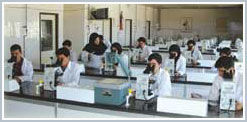This department teaches theoretical and practical areas of Immunology, Parasitology, Entomology and Mycology to the students of Medicine, Paramedical Sciences, Pharmacy, Dentistry, Nursing and Midwifery, Biochemistry, Histology, Microbiology, Parasitology and Health. The Parasitology division shares common research projects with other universities and health organizations in the field of leishmaniasis. Research in the Immunology division is related to production of polyclonal and monoclonal antibodies, cell culture, purification of proteins, autoimmunity and hypersensitivity.
Divisions of the department:
Immunology, Parasitology , Mycology, Entomology
LEVELOF COURSES HELD: M.S
Subject taught to students on following courses:
Medicine, Pharmacy, Dentistry, Nursing, Midwifery, Laboratory Sciences, Environmental Health, Social Medicine, Family Health, Public Health, , Biology and Paramedical Sciences, M.S and Ph.D in Histology, Biochemistry, Parasitology and Microbiology, Residency in Infectious Diseases.

Facilities
Educational laboratories: Immunology, Entomology, Mycology
Research centres: Parasitology laboratory
areas of Research
• The effect of fasting on the immune system of patients with kidney transplants
• The comparison of serologic methods in the diagnosis of Brucella
• Isolation and purification of antigens
• Isolation and purification of antibody classes
• Preparation of monoclonal antibodies
• Preparation of reagents for the required kits (antigen-marked antibodies)
• Initiation of different kinds of immunization and purification methods in laboratory animals
• Preparation of antigens to be used in Immunofluorescence techniques (ANA, ANCA, ETC), ASMA, AMA, all of the Elisa tests, Gel Diffusion (c3,c4,Ig,ch50)
• Cell culture
• Chemotaxis methods
• Medical entomology and the fight against carriers
• The study of the role of insects as mechanical carriers of pathogenic factors in hospital infections
• The study of ants in East Azarbaijan (notably Tabriz)
• Determination of the sensitivities of carrier Anopheles to phosphoric pesticides
• The study of home–beetles and methods of fighting them
• Identification of different species of ticks in the region
• Study of the effect of packages infected with powdered pesticides on the control of visceral leishmania in the Kaleibar region
• Comparison of the emergence of resistance in anopheles cule against powdered pesticides through laboratory selection
• Investigative studies in order to invent a simple and economical sensitivity test for powdered insecticides provided by the World Health Organization
• Epidemiologic studies in the field of visceral leishmania parasites, malaria, toxoplasma and intestinal parasites
• Studies into the prevention of visceral leishmania
• Invention and analysis of new methods of diagnosis of leishmania
• Investigation of worm infections of Echinococus granulococcus and of other species of echinococcus in jackals, foxes and other wild carnivorous animals in East Azarbayjan
• Preparation and evaluation of leishmania vaccines for control of kala-azar
• Study of the biological effects of powdered pesticides on malaria carriers
• Identification and recognition of the carriers of different types of leishmania
• Immunology of leishmania
• Study of allergen mites in Tabriz
• Identification of malaria carriers in East Azarbaijan province
• Immunology of implantation and HLA
• Tolerance and self-immunity in insulin-dependent diabetics
• Activity of Th1 and Th2 cells and cytokinin in infectious and parasitic diseases (visceral leishmania)
• Morphologic description of larvae in Iran
• Mycology (Molecullar biology) research as if PCRIN Infectious Diseases and other Molecullar biology techniques .
Address:
Medicine School, Golghasht St., Daneshghah St.
Tel : +98 411 3351074